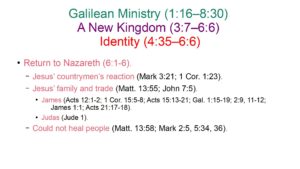The Ministry of Jesus in Galilee
Mark 1:16—8:30
A New King (1:16—3:6).
Kingdom is Near (1:15)
Popularity (1:16-45).
Conflict (2:1—3:6).
Jewish Leaders Reject Him (3:6)
A New Kingdom (3:7—6:6)
Kingdom Has Small Beginnings (4:3)
Continued Conflict (3:7-35).
Parables (4:1-34).
Identity (4:36—6:6).
Healing a Demoniac (5:1-20).
Healing Woman with Issue of Blood (5:21-34).
Raising Jairus’ Daughter (5:35-43).
He left Capernaum (possibly) and came to Nazareth—while not specifically mentioned here, since His family was there, Nazareth is the obvious destination.
Jesus teaches in the synagogue, as He has in other places, but here they ask where He got this wisdom and power.
There attitude was not that of a good kind of astonishment, but out of contempt.
They then identify His occupation before His ministry and His earthly family.
They do this to belittle Him: they might go to Him for a table or chair, but they have no interest in what He has to say or the miraculous things He does.
This is a peculiar reaction that we might not fully understand.

How many people do you know, if someone from your hometown becomes famous, do you say, “Yeah, we grew up together,” or you might drop his or her name as often as you can? So why this reaction?
One of the main differences is upward mobility. We have the ability, or perceived ability, to become rich and famous if we work hard or do something extraordinary. And we all have the potential to do what makes us happy professionally. That is fairly unique in world history.
Back then, if you were a carpenter’s son, you were going to be a carpenter and that for the rest of your life—it was your lot in life whether it made you happy or not.
That someone could and did break ranks was unusual and could make others jealous, particularly those who knew you and grew up with you. “He made it, so why can’t I? What makes Him so special?”
Another reason is, recall earlier that many of them thought He was out of His mind (3:21). Perhaps they continued to think that despite His power.
They were offended at Him—He was stumbling block to them. We find out that He was a stumbling block to more than just them, but to all Jews expecting a conquering Messiah rather than a crucified one (1 Cor. 1:23).
His family and former profession are identified.
Matthew states that He was the carpenter’s son (Matt. 13:55), while here we see that He Himself was a carpenter.
Mark doesn’t mention Joseph, Jesus’ earthly father, which leads some to speculate that he had died by this point.
Maybe he had, maybe not, but since he’s mentioned in Matthew’s account, there’s no reason to think that.
All of their sons were named after patriarchs: Jesus (Joshua), James (Jacob), Joses (Joseph—also his father), Judas (Judah), and Simon (Simeon).
My formerly Catholic Koine Greek professor in college made it a point when we got here that this can and should only be interpreted as actual brothers and sisters, debunking the Catholic doctrine of Mary’s perpetual virginity.
Jesus’ brothers were not believers at this point (John 7:5), but at least two of them became believers and wrote books of the Bible—James and Jude.
James and Jude.
James the son of Zebedee died in Acts 12:1-2. Any other mention of a James since then is most likely the brother of Jesus.
The risen Lord appeared to James after the Twelve but before Paul (1 Cor. 15:5-8).
He gave the last word in the Jerusalem Council in Acts 15:13-21.
Among the apostles, Paul only saw James and Peter after his stint in Arabia (Gal. 1:15-19 – here called the brother of the Lord).
James, Peter (Cephas), and John were seen as pillars of the faith (Gal. 2:9). They were highly influential. Peter and John, after all, were part of Jesus’ inner circle who witnessed the raising of Jairus’ daughter among other things.
He was seen as more ardent for Jewish laws and traditions (Gal. 2:11-12).
James only identifies himself as a bondservant of God and the Lord Jesus Christ in the opening to his sole letter (James 1:1), but the content appears to be combating a misinterpretation of Paul’s teachings (justification by faith not the law) which only came to prominence after Paul began his missionary journeys in Acts 13.
His letter is generally dated to be around the time of Acts 15 as is Paul’s letter to the Galatians. These two letters should be studied together.
We note James continues as a prominent leader in the church in Jerusalem (Acts 21:17-18).
Judas, or Jude, identifies himself as the brother of James and the bondservant of Jesus (Jude 1).
The only Jude we know that was a brother of a James was also a brother of Jesus—you tend to be identified with one who is more famous than you.
Among my brother’s friends, I was “Nathan’s brother.” Among my friends, he was known as “Stephen’s brother.” When we went back to our hometown, we were known as “Jerry’s boys.” Not that any of us were famous, but we were more familiar to certain groups of people and were identified by those who were more familiar.
We note here that the unbelievers were not just fellow Nazarenes (country), but also His extended family (relatives) and His own brothers (house).
He healed some people there in Nazareth, but not many. Why?
Matthew says it was because of their unbelief (Matt. 13:58)—is Jesus’ power limited by the belief of others? Yes and no.
Jesus was God and could do what He liked, but if people don’t believe, they aren’t going to seek out Jesus to be healed.
Recall that Jairus and the woman with the flow of blood sought Him out.
But also, He often states that it was their faith that made them well (2:5; 5:34, 36).
Jesus wasn’t going to heal anyone against their will.
Despite all that Jesus had said and done, they still did not believe, and He was surprised because of it.
This didn’t stop Jesus from continuing His mission of preaching and teaching, so He continued going about the villages in the area.
Jesus’ Town Rejects Him (6:6)

